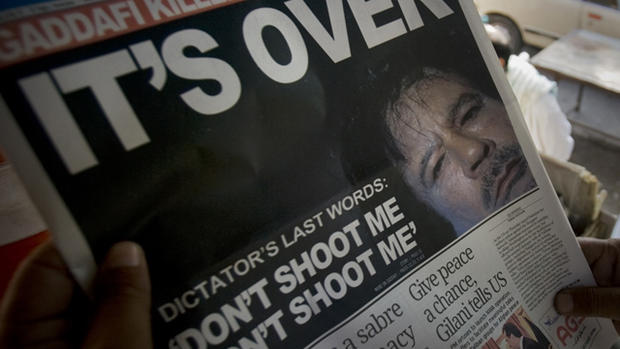Qaddafi's death met with little sadness
World leaders breathed a sigh of relief, Libyan exiles celebrated in the street, and the mother of one of Muammar Qaddafi's many victims said she was treating herself to an expensive bottle of champagne.
But jubilation over the demise of Libya's long-serving ruler is being tempered by concerns over the circumstances of his death — and lingering doubts about Libya's future.
CBS News correspondent Pamela Falk reports that, at the U.N., where the rebel National Transitional Council flag was raised last month, diplomats from around the world, almost without exception, applauded the news of Muammar Qaddafi's demise.
Some nations have been in a conflicted position of opposing NATO and U.S. action in Libya, but supporting the rebels fighting Qaddafi and his supporters. Iran, in particular, whose leaders have called the Arab Spring an "Islamic awakening," sees the change as a possible opening to better relations.
Iran's U.N. Ambassador Mohammed Khazee told CBS News, "This is positive news for the Libyan people. Some people in Iran would call this a blessing, and it is good news for the new government and for the people of Libya to be able to now determine their own government."
Qaddafi dead after Sirte battle, PM confirms
"Don't shoot": Qaddafi's final moments
With warped vision, Qaddafi maddened Libya, West
Outside the Libyan Embassy in London, 37-year-old Amani Deghayes expressed happiness, saying that she "never thought this day would happen in my lifetime." But she said she still had fears for "what happens next," citing the example of Iraq, where the fall of Saddam Hussein's dictatorship was followed by years of anarchic bloodletting.
"I hope there will be real democracy, not another crazy regime, and that everybody is represented," she said.
In Europe, leaders sounded an optimistic note.
"Finally the way is free for a political rebirth for peace," German Chancellor Angela Merkel said Thursday, pronouncing herself "relieved and very happy" at the news.
Britain and France, the powers that played a leading role in the military campaign that sealed Qaddafi's fate, said they hoped that his death would open a new — and more democratic — chapter in Libya's history.
French President Nicolas Sarkozy called Qaddafi's death a milestone in the Libyan people's battle "to free themselves from the dictatorial and violent regime that was imposed on them for more than 40 years," a message echoed by British leader David Cameron and other NATO allies.
The Vatican said it now considers Libya's interim government the legitimate rulers of the country. Qaddafi's death ended a "long and tragic" fight to crush a "cruel and oppressive regime," the Vatican press office said in a statement.
Qaddafi's victims — he accumulated many over his four decades in power — had mixed reactions.
"I'm just going to go out and buy an expensive bottle of champagne to celebrate," said Susan Cohen, whose 20-year-old daughter was blown out of the sky in the 1988 Lockerbie bombing, an atrocity allegedly carried out at Qaddafi's behest.
Zdravko Georgiev, one of several medics detained by Libyan authorities and tortured into confessing to an improbable plot to infect hundreds of children with HIV, said the dictator's death didn't cheer him.
"Why should I be satisfied?" he said. "No one will give me back the years spent in prison or undo the tortures sustained."
There was also concern about the confusion over how Qaddafi died. Libyan revolutionaries had pledged to bring Qaddafi to court to face atrocity charges, and Arab satellite TV stations have since broadcast a video showing Moammar Qaddafi taken alive by his opponents.
London-based rights group Amnesty International called for an investigation, saying that it was essential to conduct "a full, independent and impartial inquiry to establish the circumstances of Col. Qaddafi's death."
A spokesman for the International Committee of the Red Cross in Geneva, Steven Anderson, said the group had no firsthand information on Qaddafi's capture and subsequent treatment, although he said that "treatment (of people captured in conflicts) is an issue we look into and detainees must be treated correctly."
Britain's foreign secretary acknowledged concerns over Qaddafi's death in a broadcast interview.
"We do not approve of extra-judicial killings," William Hague told Sky News television, "but we are not going to mourn him."

